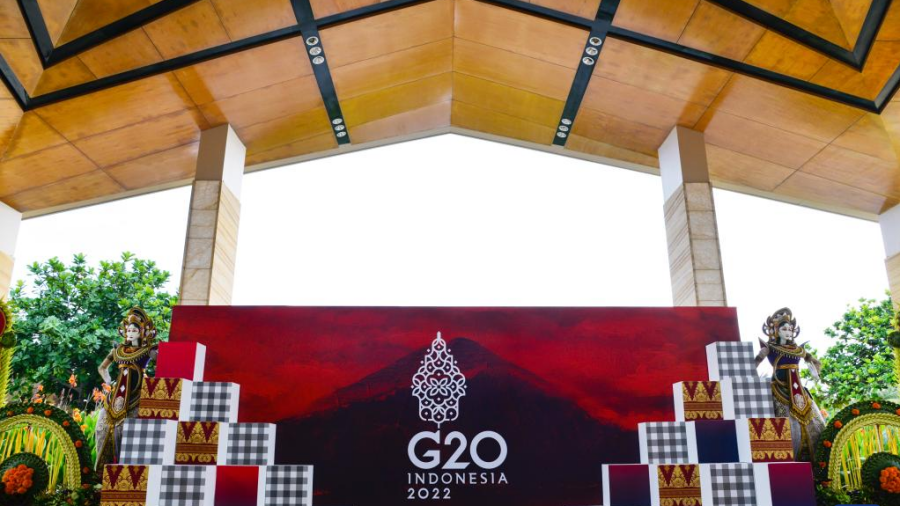
Logos and decorations for the 17th Group of 20 (G20) Summit outside a venue for the summit in Bali, Indonesia, November 11, 2022. [Photo/Xinhua]
By Andrew Korybko
International relations are in the midst of a transition from the former U.S.-led unipolar system to the emerging multipolar one. The trajectory predates the latest phase of the Ukrainian conflict but has been exacerbated by it. The crisis unleashed unpredictable forces that destabilized the global system. It's become more chaotic. There's an urgent need for certainty and stability to return as soon as possible.
Meanwhile, the G20 leaders' declaration can place humanity back on the right path. Looking beyond the participants' differing views over the Ukrainian conflict, they all have a shared interest in restoring cooperation by reversing biodiversity loss, combating climate change, and countering COVID-19. Diversifying and securing food supply chains are a priority, especially since recent disruptions caused by the earlier mentioned conflict have disproportionately affected the Global South.
This year's G20's leaders' summit theme is "Recover Together, Recover Stronger." Unilateral efforts cannot suffice. Hence, a community of a shared future for humankind has been created throughout the course of those complex globalization processes that were characterized at the end of the Cold War. No one country or group can do this for everyone on their own, nor is it in anyone's objective interests to bifurcate the global system.
The prior model of Western-centric globalization, lingering pandemic, and newfound challenges connected with the Ukrainian conflict risk have exacerbated the divide between developed and developing countries. The developing countries require support from the former in order to lessen the yawning gap between them with a view towards restoring equality in international relations.
Absent successful multilateral cooperation in pursuit of that noble goal, it could be taken for granted that the global system will continue bifurcating, which could lead to destabilization. The debt, food, and fuel crises that afflict large segments of the Global South are putting immense pressure on their societies and states. It's heightening the risk of conflict and large-scale outmigration. Developed countries can't ignore these problems since they have direct effects on them too.
Uncontrollable biodiversity loss will accelerate the consequences of climate change, which would worsen the global food crisis, especially in developing countries. Instability could spark new civil and international conflicts, causing refugees to flee into Europe, which is struggling to accommodate those from Ukraine, as well as the millions that came in the 2015 European migrant crisis. Growing socio-political tensions have partially been caused by such crises and that could destabilize the world.
The only credible chance of averting this chaotic chain reaction is for developed countries to make good on their pledge to support their developing peers. Anything less is unacceptable and risks setting into motion an irreversible sequence of events that'll be to humanity's detriment. There's no doubt that everyone has a stake in strengthening the community of shared future, including through gradual reforms.
Globalization processes will no longer be Western-centric since the rise of non-Western countries, such as China, India, and those in ASEAN would make it impossible to return to the prior status quo, which was unsustainable anyway. The evolving non-Western-centric model of globalization should prioritize the needs of developing countries in order to correct the myriad problems connected with the prior model that would have doomed it to collapse even without the recent crises.
Developed countries realize that their interests are served by assisting developing ones, ergo the inclusion of biodiversity, climate change, and COVID-related goals in the G20 leaders' declaration. It's a positive development that confirms they have accepted their declining role in international relations and realize that they cannot unilaterally advance their subjective interests at the expense of others such as before.
The only way for everyone to get through the latest series of global crises is to work together in equal partnership, which explains why developed countries have stayed committed to helping their developing peers. Everything in the world is changing, which isn't a negative development but must be responsibly managed in order to avoid unleashing any more destabilizing processes that could lead to greater uncertainties.
Developed countries must remain committed to their promises enshrined in this year's G20 leaders' declaration or otherwise the worst-case scenarios might arise and risk becoming irreversible. It's in everyone's interests to put humanity back on the right path in order to ensure equal development for all, especially those in the Global South who've been disproportionately affected by recent events. Hopefully, the G20 in Bali will be seen as a turning point for all of humanity.
Andrew Korybko is a Moscow-based American political analyst.

 中文
中文



